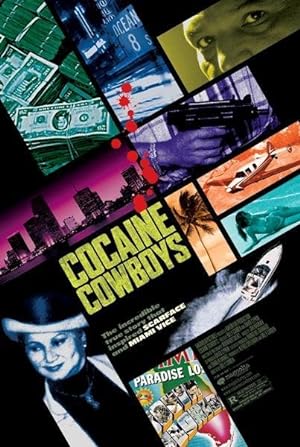Cocaine Cowboys purports to be a documentary about the development of the drug trade in Miami during the 1970s and 1980s, but it felt more like the director randomly got access to three guys who claimed to play a pivotal role then decided it was innately interesting enough to make a good movie. I am a completist, and when I found out there was a Cocaine Cowboys 2, I was not even a little tempted to see it.
Cocaine Cowboys feels less like a comprehensive, objective examination of the period than a subjective, stream of consciousness journey that is entirely dependent on the veracity of the self-professed criminals (Mickey Munday, a smuggler, Jon Roberts, a distributor and Jorge Ayala, an imprisoned assassin) confessing to the viewers. An attorney who derides the drug trade on camera is later revealed to have been disbarred for his involvement with it. Every human being lies, usually to one’s self, so while there is value to interviewing people who do so professionally, because the filmmaker seems disinterested in checking the veracity of his sources and because doing so would be incredibly difficult given the secrecy and dangerousness of their profession, I could never let go of my suspicion that I was hearing the tales of fishermen discussing the huge fish that they caught.
Cocaine Cowboys is basically a bunch of older gentlemen reminiscing about the good old days, patting themselves on the back for outwitting the authorities and bragging about what they were able to accomplish without anyone knowing it. On some level, they are proud of themselves, and they want to impress us, which is the tragedy of every criminal enterprise. To be truly successful, no one can know that you are.
Cocaine Cowboys is divided into two halves: how Munday and Roberts were able to establish the business then how it came apart when Griselda Blanco became an enforcer for the Medellin cartel and attracted too much attention with her violent methods. I was intrigued by a couple of incidental points made by the documentary. I would love an unofficial history of office politics in criminal enterprises. Munday clearly could not stand Roberts, but it was obvious that Roberts had no idea and thought they had a solid relationship. What motivated Munday to work so closely with Roberts instead of trusting someone else or was Roberts that good? Blanco was a childhood friend of the Ochoas, which explains why she was untouchable for so long.
Cocaine Cowboys claims that Miami would never become internationally famous without the infusion of money from the illegal drug trade, and once authorities stamped it out, the economy died. If drugs became legal, would the same thing happen, but without the violence? I don’t touch illegal drugs and other than caffeine, ibuprofen and Zyrtec, I stay far away from the legal stuff unless prescribed, but after hearing a number of police chiefs say that we have lost the war on drugs, and it would make more sense to make it legal and regulated, I have begun to consider the wisdom of their words despite my personal disdain. While I would prefer that people confront and tackle the cause of the physical or mental pain in their lives instead of self-medicating, people take drugs regardless of whether they are permitted to or not. I instinctually think of it as blood money, but it seems to work in Europe and destroy less lives. If it could also make communities survive and flourish, it could be worth exploring.
I would not recommend Cocaine Cowboys unless you enjoy hearing wild stories and are unconcerned about clarity or credibility. I have no idea why I thought that I would enjoy watching this documentary and put it in my queue. Maybe it was on some list of notable documentaries that you must see.
Stay In The Know
Join my mailing list to get updates about recent reviews, upcoming speaking engagements, and film news.





